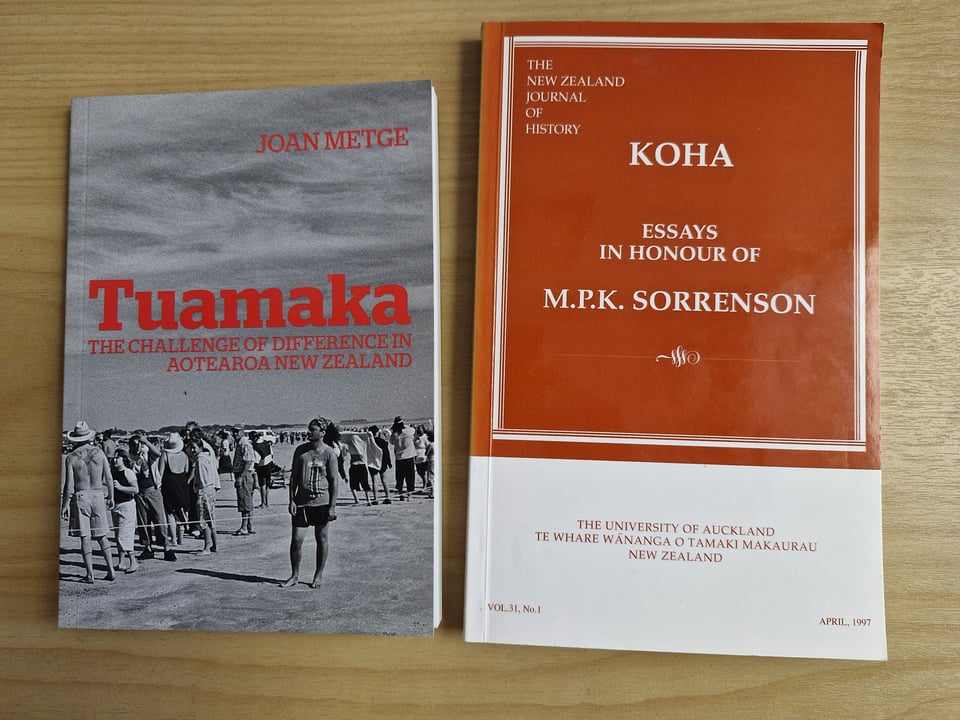In Memoriam: Dame Joan Metge and Emeritus Professor Keith Sorrenson
In this post I pay tribute to two scholars who made significant contributions to our understanding of Aotearoa New Zealand culture, society and history.
Dame Joan Metge, who died this week aged 95, was a social anthropologist who helped found the Department of Anthropology and Māori Studies at Victoria University of Wellington in 1967. She was known for her work promoting cross-cultural awareness and understanding between Māori and Pākehā communities, following a doctoral thesis that explored Māori urbanisation.
Her many important works included A New Maori Migration (1964), The Maoris of New Zealand (1976), Talking Past Each Other (1978), In and Out of Touch (1986), New Growth From Old: The Whanau in the Modern World (1995), and Tuamaka: The Challenge of Difference in Aotearoa New Zealand (2010). In that 2010 work (p.27) , Metge brilliantly examined William Hobson’s famous statement at Waitangi in February 1840 and its English translation:
At Waitangi on 6 February 1840, William Colenso tells us, Lieutenant-Governor Hobson said to each rangatira who signed the Treaty: ‘He iwi tahi tātou’. Presumably he was coached by somebody, probably Henry Williams. Colenso translated this into English as ‘We are now one people’. In doing so, he missed three subtle points. First, the word iwi means nation as well as people. Secondly, if Hobson meant one (unified) people he should have said ‘he iwi kotahi’; tahi without the prefix ko means together. Thirdly, the last word, tātou, certainly means the first person plural we/us, but it is a special form, one without an equivalent in English. Use of tātou signals the fact that the we in question comprises two or more distinct groups, which are and remain distinct within the unity.
This succinct Māori sentence is incredibly difficult to translate into English in a way that does it justice. The problem is that for many years Colenso’s translation has been used to emphasise the idea that ‘we are all New Zealanders’, a model I have rejected as unduly reductionist. Some years ago I suggested the translation ‘We many peoples together make a nation; but that was too easily interpreted as advocacy of multiculturalism, a model that also has flaws. Perhaps it would be good strategy to leave the saying in Māori, untranslated, while all of us – older New Zealanders, young New Zealanders and new New Zealanders – continue to debate and work out how to relate to each other, with the Treaty as our guide.
In 2006 the Royal Society Te Apārangi established the Metge Medal named in her honour for a social scientist who has not only shown excellence in their research area but also in creating connections and opportunities for others in the field. In 2015, she was awarded the Prime Minister’s Ward for Literary Achievement in Non-Fiction. For more, read her 2015 interview with Dale Husband on E-Tangata and the tributes to her on the VUW and Auckland university anthropology department Facebook pages.

While I met Dame Joan Metge a couple of times I didn’t really know her. It was a different story with M.P.K. (Keith) Sorrenson (Ngāti Pūkenga, Pākehā) who died in late July, aged 93. I spent a fair bit of time getting grilled by Keith in various Waitangi Tribunal district inquiries in which I was giving expert evidence for the claimants that he sat on as a member and later worked alongside him on a few other inquiries as a Tribunal report writer.
He played a significant role in promoting understanding of Aotearoa New Zealand history, from his hugely influential Masters thesis on Māori land loss in 1955 through to a long period of service as a member of the Waitangi Tribunal in later life.
Following his MA at Auckland University College (as it was then known) in 1955, Keith later did a PhD on African history at Oxford University between 1959-1962, followed by two years at Makerere University in Uganda. In 1964 he returned to Auckland University, quickly rising to be appointed to a Chair in History, which he held from 1968 until his retirement in 1995.
In the meanwhile, Keith became actively involved in the local anti-Apartheid movement, chairing CARE (Citizen’s Association for Racial Equality) in the early 1970s and taking part in the 1981 protests against the Springboks tour.
In 1985 the Treaty of Waitangi Act was amended to allow the Waitangi Tribunal to investigate acts and omissions of the Crown dating back to 1840 and the following year Keith became one of the Tribunal’s first historian members, remaining on the Tribunal until 2001. The nature of the Tribunal’s work meant that he continued working on his final reports long after his last warrant as a member had expired.
Keith Sorrenson was part of a new generation of New Zealand historians who emerged from the 1950s onwards to take a critical new look at the country’s past. Two other historians of that generation, Alan Ward and Judith Binney, both contributed to a collection of essays published in a special edition of the New Zealand Journal of History in 1997 in honour of him. For more read the tribute to him on the New Zealand Historical Association website or Alan Ward’s 1997 piece from the NZJH.
Add a comment: